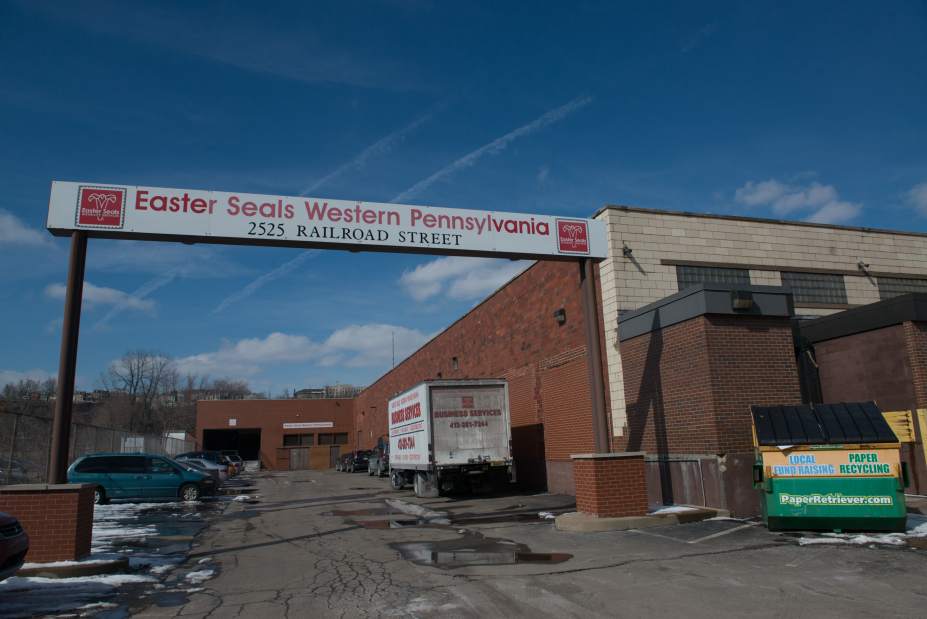Easter Seals merger in Pennsylvania raises ethics concerns
It started as a merger between two money-losing charities serving people with disabilities.
The deal let Easter Seal Society of Western Pennsylvania absorb $6.1 million in assets — some of it earmarked — from its Central Pennsylvania counterpart and bolster its sagging bottom line.
But when it shut a 50-year-old children's rehabilitation clinic it got from its acquired affiliate in Altoona and shipped pricey therapy equipment elsewhere, tempers flared.
The move sent Altoona supporters and public officials into a furor over what they perceive as a raid on a children's clinic with roots dating to the early 1960s, before it bore the name “Easter Seals,” as the Blair County Society for Crippled Children and Adults. They say Altoona donors intended those assets to stay in their region.
“If you're the CEO of Western Pennsylvania (Easter Seals) and you acquire a facility new to you and 18 months later you make plans to close it and take all the assets from that facility, in the corporate world that's raiding,” said state Sen. John Eichelberger, R-Blair.
“I just don't think that's appropriate or ethical, and I think there are some legal issues here.”
Easter Seals Western and Central Pennsylvania CEO James Bennett deferred questions to Karen Kavic, vice president of development.
Kavic said, “Both boards determined that Easter Seals Western Pennsylvania would be the surviving organization. This was a deliberate and thoughtful process that took place over an extended period of time. Assets go to the surviving organization.”
She added that money that came with donor restrictions will be used as directed.
The Strip District-based charity acquired financial control over its Central Pennsylvania counterpart in June 2013 because both nonprofits had been bleeding revenue for years. Their two boards on tax forms touted the move as a way to “enhance their ability to provide and expand programs and services.”
Easter Seals Central Pennsylvania had something the Pittsburgh one did not: $6.1 million in net assets, including almost $3 million in trusts and endowments.
The merger helped propel the Pittsburgh-based affiliate from net assets of negative $1.2 million — a deficit largely from pension liabilities — to $5.765 million in the black.
Closure not part of original plan
Shutting the Altoona facility was never part of the 2013 merger plan, said Katy Neas, executive vice president of public affairs in Washington for the national Easter Seals Inc., which helped oversee the merger.
“It's not something ever done lightly, and it's not something that is done with any pleasure,” Neas said. “It does mean that we've exhausted any other avenues to try to keep that program open and available.”
It's “heartbreaking” that Altoona residents perceive Easter Seals pulling out of their area as some sort of “malicious attack” by the Pittsburgh-based organization, said Peggy M. Outon, executive director of the Bayer Center for Nonprofit Management, which helped the merged organization come up with a strategic plan.
“Nobody wanted this to happen,” she said.
A 2010 national peer review by Easter Seals Inc. showed that the majority of the Central Pennsylvania affiliate's losses stemmed from the Altoona children's clinic. The clinic lost more than $360,000 in 2013-14 alone, said Easter Seals Western Pennsylvania Board Chair Lauren Rushak, a downtown Pittsburgh attorney.
The losses at the clinic, which provided occupational, physical and speech therapy to more than 130 children, were threatening the ability to treat all 22,000 adults and children the broader organization served, Rushak said.
The Pittsburgh-based chapter announced Nov. 11 it was shutting the Altoona clinic and wanted to use the building for administrative purposes — a plan that was quickly nixed when the Ward Foundation, which built the clinic on county-owned land in 1964, made it clear that its 99-year lease limited its use to serving children directly.
Eichelberger, with support from the Blair County Board of Commissioners, scrambled to find another provider to continue the therapy services.
The nonprofit Tyrone Regional Health Network and its contracting provider ProCare Health Systems acted quickly to come up with a county-approved plan to take over the clinic.
But in late January and early February, just as the new providers prepared to take over, vans arrived to haul off tens of thousands of dollars in equipment. Workers took everything from individual donor plaques to pricey tools used to help children grappling with light and sensory sensitivity problems, said Jim Foreman, president of ProCare, a therapy provider with 13 locations in the Central Pennsylvania region.
It was far from the “seamless transition” for which Foreman hoped.
“On the contrary, it was ready, aim, fire — it was move everything out,” Foreman said. “They just came in and emptied the place.”
Equipment to be spread out
The equipment and items removed from the Altoona site “were not part of the negotiation with the new clinic that has taken over operations,” Rushak said. Those assets “will continue to be used to fulfill the organization's important mission.”
“We knew we would make use of this equipment,” Kavic said. She said it will go to Easter Seals programs in other areas, including State College, Pittsburgh, Johnstown, Somerset, Franklin, Harrisburg and York.
Rushak said earmarked donations that have not been used to date will be returned to donors, and in some instances already have.
“It's not that unusual to see that when two entities merge — initially there's this sense that it's going to be a win-win,” said Ken Berger, president of the nonprofit watchdog Charity Navigator. “And then at the end of the day the entity that really has the power and the authority will do a gutting and just pull in the resources for the purposes of the more powerful of the two entities.”
Before the merger, contributions to the Central Pennsylvania chapter were declining but surpassed what the Pittsburgh-based affiliate was pulling in.
Gifts, grants and contributions for Easter Seals Central Pennsylvania dropped from $1.1 million in 2007 to $629,731 in 2012.
Meanwhile, Easter Seal Society of Western Pennsylvania collected $360,161 in contributions in 2007, the year it began pursuing the merger. Those contributions increased to $410,213 in 2011.
Children's services continue
Most everyone involved in the Altoona transition seems to agree on at least one positive outcome: Therapy services for the Altoona children have continued with minimal disruption.
The new providers have about 90 to 100 children clients, most of whom carried over from the Easter Seals programs, Foreman said. They hired eight to 10 employees whose positions Easter Seals eliminated.
“All we want is stuff that belongs ethically; if things belong in Central Pennsylvania they should stay here,” Foreman said. “If they were not designed to be here, by all means we'd have helped them pack it.”
Natasha Lindstrom is a staff writer for Trib Total Media. She can be reached at 412-380-8514 or nlindstrom@tribweb.com.



